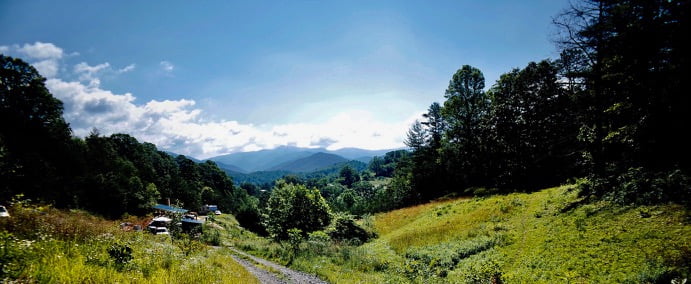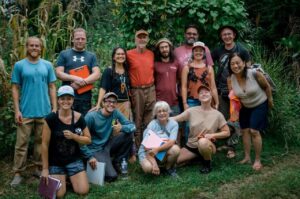Do you dream of owning your own land and creating an oasis of sustainability, beauty, and productivity? Most of us do who are interested in permaculture, gardening, natural building, and earthskills. Indeed, ownership can provide a sense of security and rootedness, so we can really dive into our dreams and visions.
However, buying land is a big deal! It can mean going into a huge debt. Such a debt hanging over your head can end up trapping you in a job in order to pay for your land. As a result, you may not have the time or energy to develop your place. It can feel like a bit of a catch-22. Fortunately, there are ways to choose land wisely, in order to avoid such a debt trap. Indeed, it’s important to manage your personal finances well so that you’ve got both time and money to invest in a land project in the long-term.
Here are 3 suggestions from our experience that will help you choose land that you can actually afford. In fact, Natalie utilized all of these strategies in order to purchase her homestead. Now, her little place is the gorgeous and thriving Wild Abundance campus. As you dream of buying land, let these ideas temper your dreams and hopefully guide you toward a more balanced, less stressful land-based life.
Consider 1 – 5 acres
This may seem smaller than what you’ve imagined, but smaller parcels can be extremely productive and satisfying. As long as you aren’t attached to intensive, self-sufficient animal agriculture, 1-5 acres will probably be plenty of space for you. With intensive, organic agriculture, it’s possible to grow a significant amount of food on an acre or less.
Consider steep, forested, or degraded land
This “less ideal” land tends to be cheaper. We’re using quotes here, because beauty is in the eye of the beholder. With intelligent design and creativity, a hilly, wooded, or worn-out piece of land can be your ideal, especially if it means you don’t have a huge debt hanging over your head. The Wild Abundance campus was absolutely an example of this. Prior to Natalie purchasing it, a super dense pine forest had grown up on slopes that were once the eroded pastures of a dairy farm. Where our abundant, leaf-shaped garden now sits was the soggy outcome of poor water management.
Here are some other examples of how “less ideal” land can actually turn into an eden: Terracing can render a hillside into a productive garden; many valuable medicinal herbs can be cultivated in the woods; restoring degraded land is an important and rewarding task, plus, it can mean starting out with a blank slate, which has its benefits. Check out Plants for a Future for ideas about useful plants that can grow in all kinds of unconventional situations (like shade, bogs, etc.)
Consider buying land with friends
Land isn’t usually priced the same per acre for large and small parcels. In other words, if you buy 50 acres, you end up paying less per acre than if you buy 5. In order to take advantage of this value, you’ll need the money to buy a larger piece of land. But, you may only want, need, or be able to afford a smaller portion of it. In this case, there are several ways you can bring a group together to share the land and the overall cost.
Buy land collectively and split it up
In this scenario, you pool money to purchase a large tract of land, then legally divide (parcel) the land so that you each own your own piece. This will depend on local zoning laws and access. For example, zoning laws sometimes prohibit very small parcels in rural areas. Also, each individual parcel will need to have its own access. You may need to establish right-of-ways so that everyone can have legal access to their place. Here’s more on the legalities and particulars of parceling land.
Group ownership of land
There are a couple of ways to own land collectively. One is to form a limited liability corporation (LLC) that technically owns the land. Each person in the group would then become a member of the LLC. This takes some legal legwork up front. Another option is to simply share the deed. This is simpler up front, but harder to change later. Plus, sharing a deed means that each member of the group is tied to one another financially, including your responsibility for debts.
Buy land individually and sell off smaller parcels
One option is to take on a mortgage for a large tract of land with the intention of selling off parcels. This obviously involves some risk. If you buy with the intention of selling parcels, definitely consider zoning and access, as mentioned above. If the land is in a popular area, is zoned appropriately for splitting up, and various parcels within it have good access, you’ll probably be just fine. Another consideration here is that the financial pressure of holding a big mortgage can lead to hasty neighbor decisions. Meaning, when you need the money, you might sell to someone who isn’t actually your ideal neighbor. Try to take your time and consider who you sell to, based on more than just financial need.
To learn more about living off the land using permaculture principles, check out our extensive resource: How to Live off the Land: A Permaculture Guide




